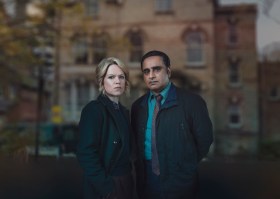Given that its tale tells of children spirited away to a seemingly magical world and following clues in search of an adventure, there’s much that’s familiar about Tomorrowland. There’s no yellow brick road, but there are string-pulling men. There’s no supernatural school, but there are unconventional methods of transportation. There’s no extra terrestrial, but there is a bike ride. There’s no treasure map, but there are traps to avoid and pursuers to flee.
Writer/director Brad Bird (Mission: Impossible – Ghost Protocol) and co-scribe Damon Lindelof’s (TV’s The Leftovers) feature also boasts men tinkering with gadgets and kids outsmarting adults, in an effort that always appears as though it has been pieced together from well-worn components. Indeed, take many a childhood-oriented film gone by, and its threads will likely be found weaved into Tomorrowland. Nostalgia is the feature’s pervading tone, along with wonder. Feelings of reminiscence and hope combine, one never forgetting the memories of a simpler past, the other directed towards a brighter future.
So it is that watching Tomorrowland becomes an act of viewing visions of what has come before and what might come to be, each rising, falling and coinciding. In their own time periods, two wide-eyed youngsters – Frank Walker (Thomas Robinson, TV’s The Protector) and Casey Newton (Britt Robertson, The Longest Ride) – are lead on a quest towards the titular scientific utopia, with the adult Frank (George Clooney, The Monuments Men) becoming a reluctant mentor to the plucky teenager that follows in his footsteps decades later.
Their journeys traverse the 1964 World’s Fair and the dismantling of a NASA launch site at Cape Canaveral, bear witness to jet packs, hovering trains and revamped international monuments, and inspire an abundance of questioning, pondering and trekking in between. A mysterious girl, Athena (Raffey Cassidy, Mr Selfridge), guides their paths both then and now, determined to immerse Frank and Casey in Tomorrowland’s secrets, while a stern authority figure, David Nix (Hugh Laurie, Veep), also proves influential. What reigns, though, is a simple, binary tussle between negativity and positivity, or decrying problems and proposing solutions.
In fact, though Bird and Lindelof’s script is filled with complications of the robotic, environmental and emotional kind, it is surprisingly sparse on story and conflict, apart from its embrace of the conventions and elements of its family-friendly genre. As a place, Tomorrowland is a symbol of promise that a forward-looking teen is drawn to, and a distrustful inventor has dismissed but must learn to rediscover. As a film, it’s an embodiment of unfailing, against-all-odds optimism as a preferred mindset. It isn’t by accident that brand synergy sees the feature adopt the name of not just a well-known part of Disney’s theme parks, but its physical ode to imagining and believing – and it certainly looks as though little expense has been spared in creating cinematic, futuristic images to match.
Alas, what helps the film soar also bogs it down, for there’s only so far that a movie can travel with enthusiasm and earnestness as its primary sources of fuel. Slick renderings of the towering central locale and its technological trinkets gift Tomorrowland with a visual manifestation of its artistic fervour, as does the camera’s penchant for gliding through the shimmering space; however the heavy handedness of the accompanying sentiments zaps its energy. A happy sight for roaming eyeballs the feature might be, but it is also repetitive in getting its point across. Asking viewers to be swept up in an adventure doesn’t always work when they’re constantly aware that they’re being given a life lesson.
Thankfully, the cast helps enliven the ride through recognisable beats, striking sights and over-emphasized statements, including the fine pairing of Clooney in cantankerous mode and Robertson’s bubbling over with determination and confidence. They’re the epitome of the movie’s contrast of despondency and assurance, of course, but their free-flowing rapport brings nuance otherwise lacking in the screenplay. Their character traits also foreshadow the reactions Tomorrowland inspires, cynicism and acceptance clashing in what feels like a movie-based personality test. Audiences may fall on either side; however the film itself resides firmly in the middle, despites its best efforts otherwise. Tomorrowland pushes a dream through comfort and creativity, serves up images that engage the imagination, but tempers its striving for magic with the forcefulness of its message.
Rating: 2.5 stars out of 5
Tomorrowland
Director: Brad Bird
USA, 2015, 130 mins
Release date: May 28
Distributor: Disney
Rated: PG
Actors:
Director:
Format:
Country:
Release:





